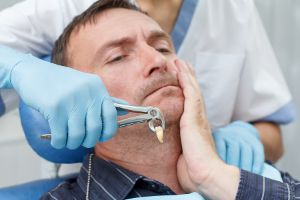What You Need To Know About Tooth Extractions
 Tooth extraction is a common dental procedure in which a tooth is carefully removed from its socket in the bone. This dental procedure is usually performed when a tooth is severely damaged or decayed, and alternative treatments are not likely to be effective.
Tooth extraction is a common dental procedure in which a tooth is carefully removed from its socket in the bone. This dental procedure is usually performed when a tooth is severely damaged or decayed, and alternative treatments are not likely to be effective.
Why Are Teeth Extracted?
There are several reasons why dentists need to extract teeth, even though it is a stressful process.
- Severe Tooth Decay: When decay has reached deep into the tooth and affected the pulp, extraction may be necessary if root canal therapy is not an option.
- Gum Disease: If periodontal disease has caused loosening of the teeth, it may be necessary to extract them.
- Impacted Teeth: This mostly occurs with wisdom teeth when they do not have enough room to grow normally. Impacted wisdom teeth can be painful, and if not treated, can lead to more serious issues like infection or cysts.
- Orthodontic Treatment: Tooth extraction can help to accommodate orthodontic appliances when the mouth is too crowded.
The Tooth Extraction Procedure
The extraction process begins with a local anesthetic, which numbs the area where the tooth will be removed. Once the local anesthetic takes effect, the dentist uses special tools to gently and carefully remove the tooth. The dentist applies steady pressure to the tooth’s root, causing the ligament space to expand and the tooth to detach from its ligament. Then, the tooth is carefully removed from your mouth and the healing process begins.
Advanced Forms Of Anesthesia
For a more complex extraction, such as the removal of an impacted wisdom tooth, or cases where the patient is particularly nervous, additional forms of sedation may be used. This could range from a light level of sedation provided by nitrous oxide, commonly known as laughing gas, to the highest level of sedation, typically offered through oral while conscious or intravenous sedation medications.
The level of anesthesia you receive is something your dentist will discuss with you before the procedure. It’s important to follow the pre-extraction guidelines closely, especially if you have heavier sedation scheduled.
Pain Management
It is a common concern that tooth extraction will be painful. However, with today’s technology and anesthesia, the discomfort experienced during a tooth extraction has significantly reduced.
Post-operative pain is often manageable with over-the-counter or prescribed pain medications. If you had complications with the extraction and your dentist believes you’ll be in more pain than the average patient, they may decide to prescribe a higher dose of a painkiller to prevent you from experiencing a lot of pain during your recovery.
Caring For Your Mouth Post-Extraction
After an extraction, it’s important to follow a stringent oral care routine to prevent infection. This may include avoiding smoking, gently cleaning the area around the extraction site, and taking any prescribed antibiotics.
Some swelling and discomfort are normal, but any excessive pain should be reported to your dentist as soon as possible. It’s also important to call your dentist if you develop a fever because it’s a sign of infection.
Risks & Complications Of Tooth Extractions
Like any procedure, tooth extractions come with certain risks, such as infection, bleeding, or reaction to anesthesia. In some cases, small bone fragments may surface from the extraction site days after the procedure, but these can be easily removed by your dentist.
Circumstances Requiring Special Attention
Certain circumstances prompt a more cautious approach to tooth extraction. For instance, taking blood thinners can complicate the extraction process, and pregnant women are encouraged to delay non-emergency extractions until after the baby’s birth.
Alternatives To Tooth Extractions
While tooth extraction is an excellent choice for certain dental issues, other treatments might be more suitable in different scenarios. Depending on the extent of tooth damage or decay, treatments could include fillings, crowns, or root canal procedures.
Trust Your Teeth To An Experienced Dentist
If you’re in San Ramon, CA, and require a tooth extraction or want to learn more about your options, reach out to Dr. Carol Jin, DDS, for professional guidance and treatment. Our team is experienced and will make sure your procedure is as comfortable as possible for you.



